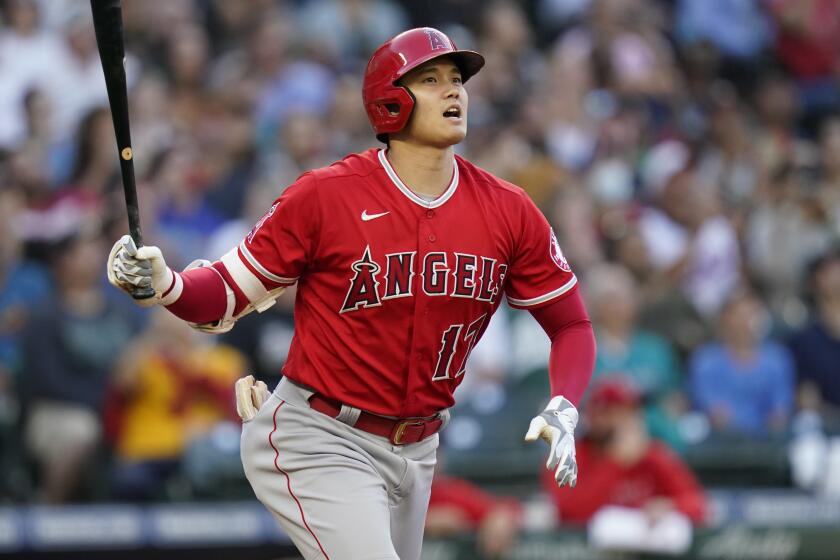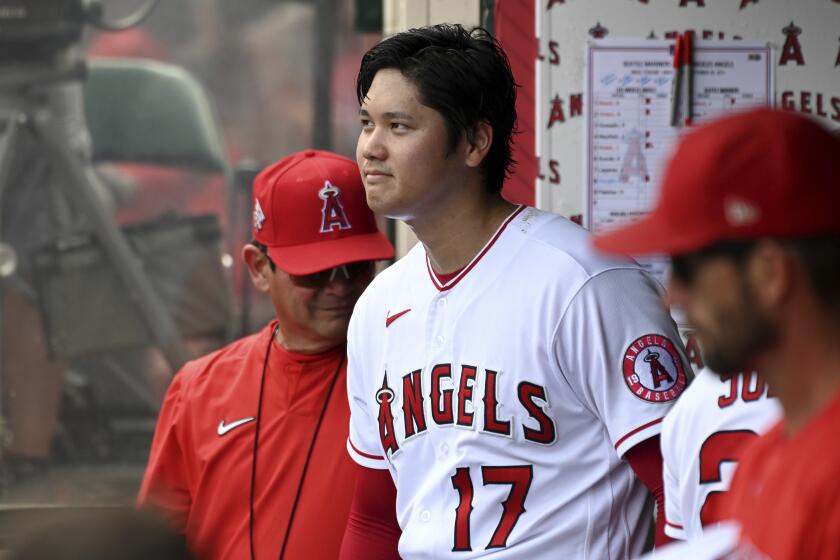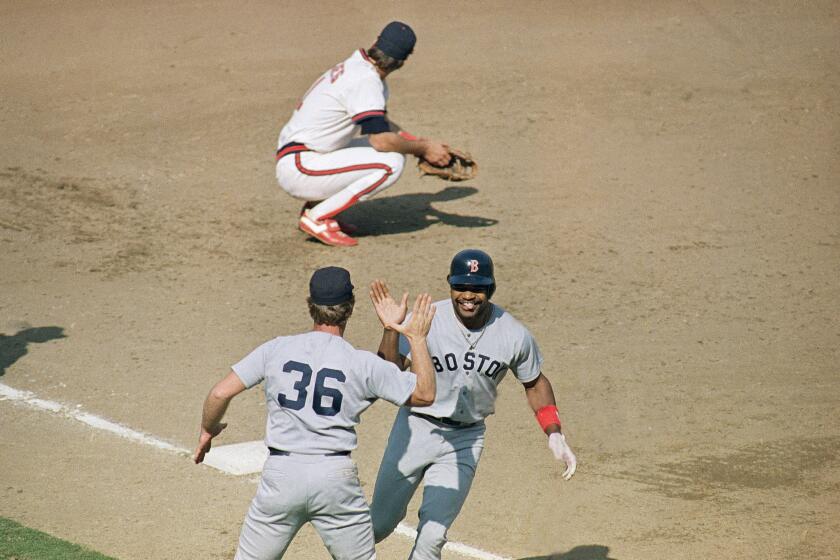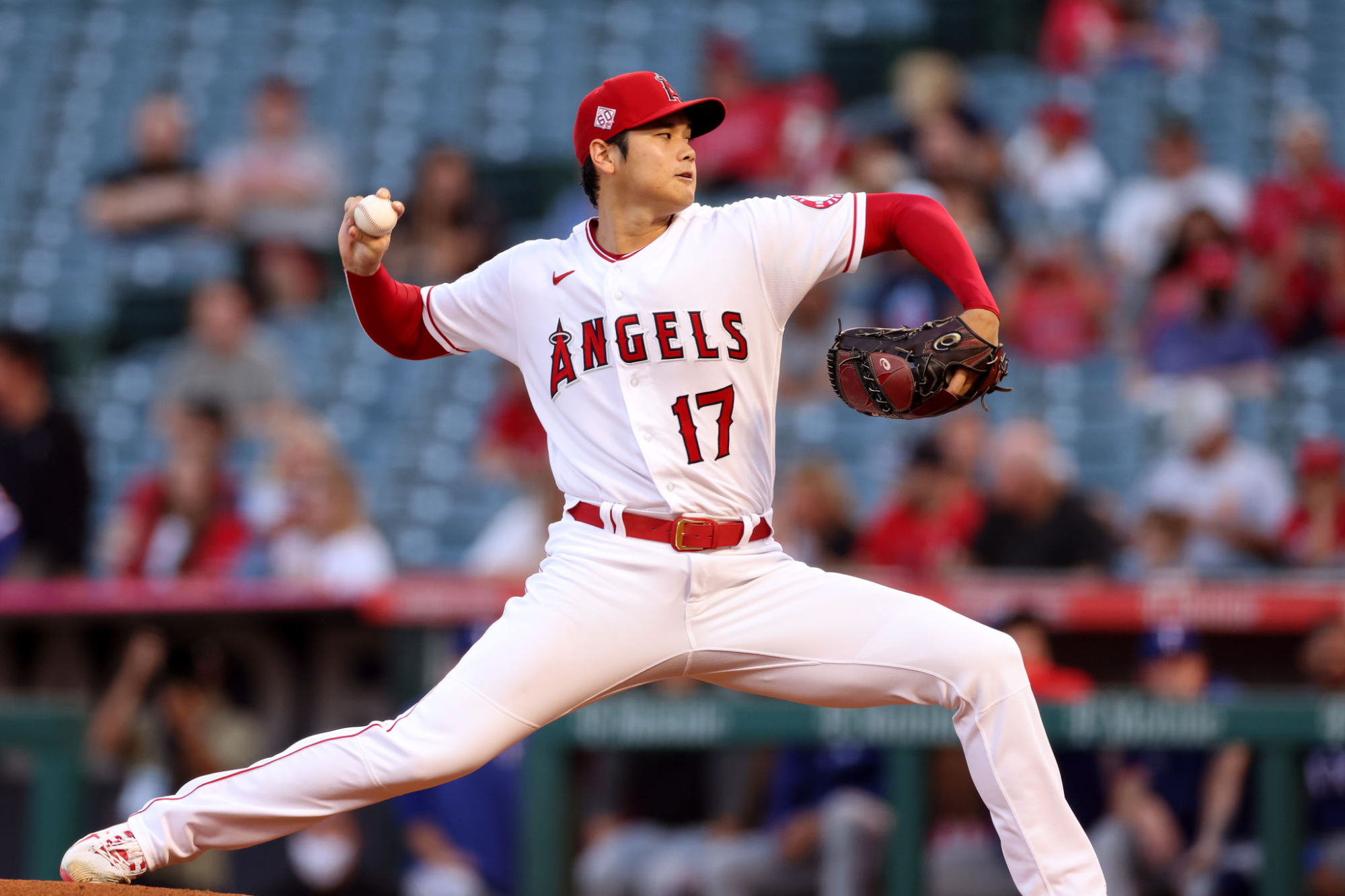
- Share via
Shohei Ohtani was surrounded on all sides.
Commissioner Rob Manfred flanked one shoulder. Interpreter Ippei Mizuhara followed close to the other. And all around them, a horde of other Major League Baseball personnel lurked in an oversized circle, whisking the Angels two-way star through a crowded corridor at Minute Maid Park in Houston minutes before the opening game of last month’s World Series.
There aren’t many occasions where baseball players look so much like movie stars, their simple presence pulling attention into the gravity of their orbit.
But there aren’t many baseball players like Ohtani, whose 2021 season with the Angels didn’t just capture the sport’s imagination but redefined the limits of what once seemed possible for a single player to accomplish.
It’s why he became one of the league’s biggest attractions this year, hitting 46 home runs with 100 RBIs while also striking out 156 batters with a 3.18 earned-run average in 23 pitching starts.
It’s why Manfred summoned Ohtani in front of dozens of media members ahead of the Fall Classic, using the national stage to announce the 27-year-old as the 16th recipient of the special Commissioner’s Historic Achievement Award.
And it’s why, on Thursday night, Ohtani not only won the American League MVP as expected, but did so unanimously by earning all 30 first-place votes.
Angels star Shohei Ohtani was a top hitter and a strong starting pitcher, delivering a once-in-a generation season that earned him unanimous AL MVP honors.
His performance was that unprecedented. That historic. That unique.
“Getting it unanimously makes it that much more special,” Ohtani said, through Mizuhara, “and helps me stay motivated to put up great numbers for myself and the team.”
After Bryce Harper of the Philadelphia Phillies was named as the National League MVP, beating out the Washington Nationals’ Juan Soto and San Diego Padres’ Fernando Tatis Jr., Ohtani smiled as his landmark selection was announced by Hall of Famer Frank Thomas.
Ohtani became the fourth Angels player to win an MVP award, joining Don Baylor (1979), Vladimir Guerrero Sr. (2004) and Mike Trout (2014, 2016, 2019); the second Japanese-born recipient, after Ichiro Suzuki in 2001; and the 19th unanimous selection, a feat last accomplished by Trout in 2014.
No past winner, however, had a season quite like his.
And now, as fall turns to winter, and the mythical trance of his memorable season fades further into the past, there’s a question about the future left in its wake.
Was this all just one magical year, a stunning but unsustainable burst never to be seen again? Or can Ohtani actually maintain such atmospheric heights, and turn a challenge that once seemed impossible into an annual occurrence?
Asked that night in Houston, Ohtani initially deflected, trying to downplay speculation about the future. But eventually, he did give an answer, making his future expectations clear.
“I feel pretty confident that I could repeat what I did this year,” Ohtani said. “I just need to get out there and play every day and put up good numbers. I think I’ll be able to at least have a similar season as this year.”
Twelve months ago, Ohtani’s future in both roles was in doubt.
He had yet to make a full return to the mound after undergoing Tommy John surgery at the end of his rookie MLB season in 2018. His play at the plate was suffering in the wake of a knee surgery that cut his 2019 campaign short.
When general manager Perry Minasian was hired a year ago, many of his early conversations with coaches and staffers around the club revolved around how to tap into Ohtani’s tantalizing raw talent, and in what way to utilize him in 2021?
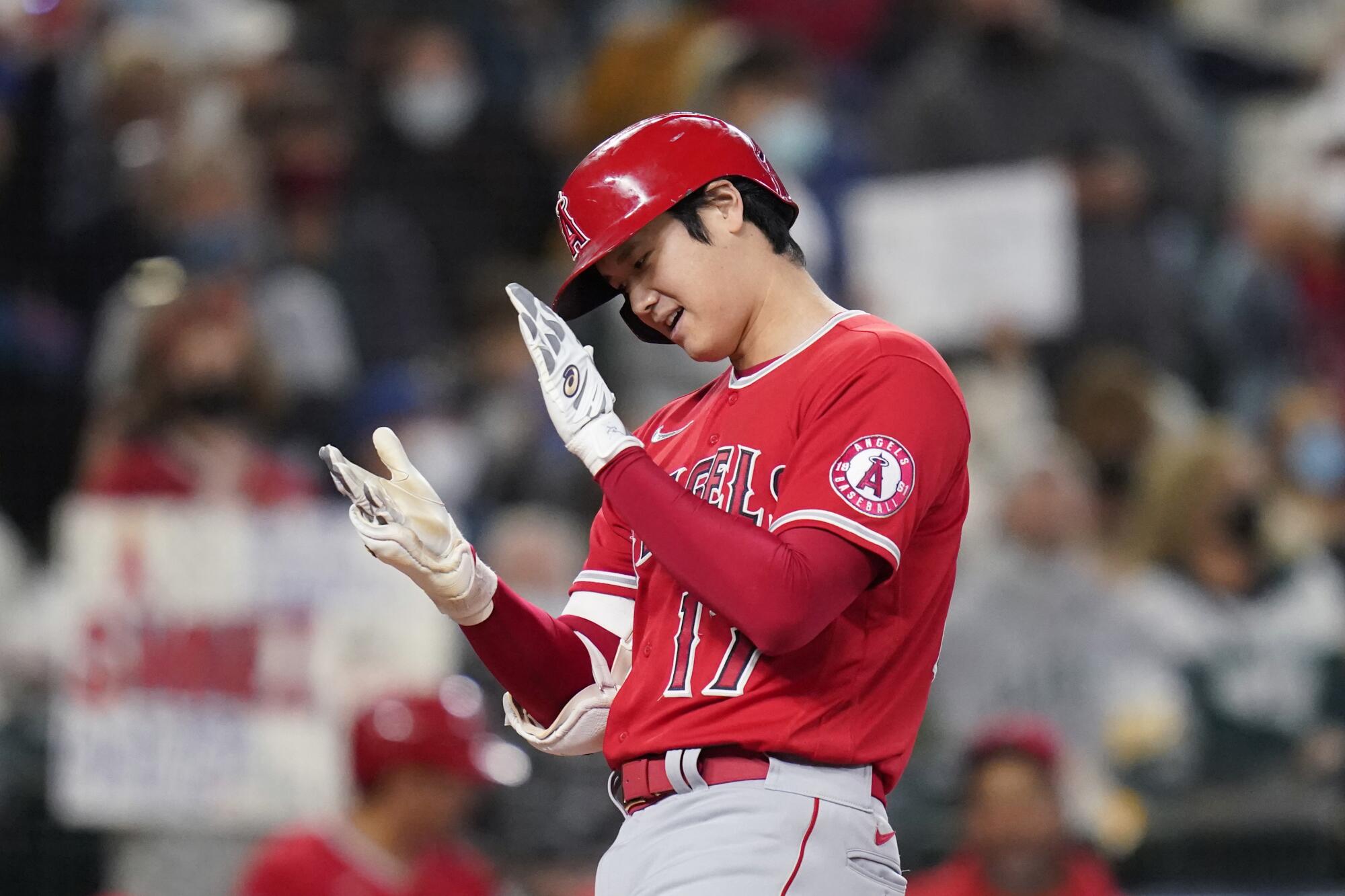
Before long, the Angels’ now well-documented plan crystalized: They removed restrictions on Ohtani’s usage — eliminating set rules on how often he took the mound, when he would take days off and more — and instead determine his workload based on how he felt throughout the year.
Reflecting back on those discussions during the league’s general managers meetings in Carlsbad, Calif., last week , Minasian grinned at how it all unfolded.
“Obviously,” he said, “it worked out.”
Indeed, Ohtani’s production was astounding.
He appeared in 158 games. He pitched more than 130 innings. He avoided any stints on the injured list. And he missed only a handful of pitching starts because of random setbacks, such as a finger blister in April and a sore thumb that was struck by a stray foul ball in the dugout in July.
He showed few signs of fatigue, as well. His pitching numbers improved as the season progressed, a byproduct of improved command of his fastball and an ability to work deeper into games. At the plate, his only prolonged slump came in August and early September, when the Angels’ banged-up lineup made it easier for opponents to pitch around him.
“Thinking back, there wasn’t a point in the season where I really felt tired or fatigued,” Ohtani said before the team’s final game. “I was able to play on a daily basis with good rhythm. Just kept that up through the whole season.”
Hernández: Shohei Ohtani realizes goal to be the best. Where do the Angels fit in his future?
Shohei Ohtani wanted to the best baseball’s best player, and he achieved that with his AL MVP honor. But can he win a World Series with the Angels?
Ohtani’s final stats also included a .257 batting average, .965 on-base-plus-slugging percentage, 26 stolen bases and 96 walks as a batter, plus an impressive 9-2 record and 1.09 walks-and-hits-per-inning as a pitcher. He credited much of the success to his training program last offseason.
For the first time in his MLB career, he wasn’t nursing an injury or stuck going through rehab, allowing him to push himself in ways he couldn’t in years past.
He fast-tracked his throwing program, integrating bullpen sessions earlier in the offseason. He went through more live batting practice, too, trying to rectify the mechanical issues that plagued him during a career-worst 2020 season at the plate.
Visits to the Driveline training center near Seattle aided those efforts. So did a refined dietary plan — which included blood tests to determine which foods were best for his system — that helped him add weight and build muscle, especially in his lower half.
The benefits started showing up early in spring training. He eclipsed 100 mph by his third bullpen session. He was hitting 460-foot home runs by the opening week of Cactus League play.
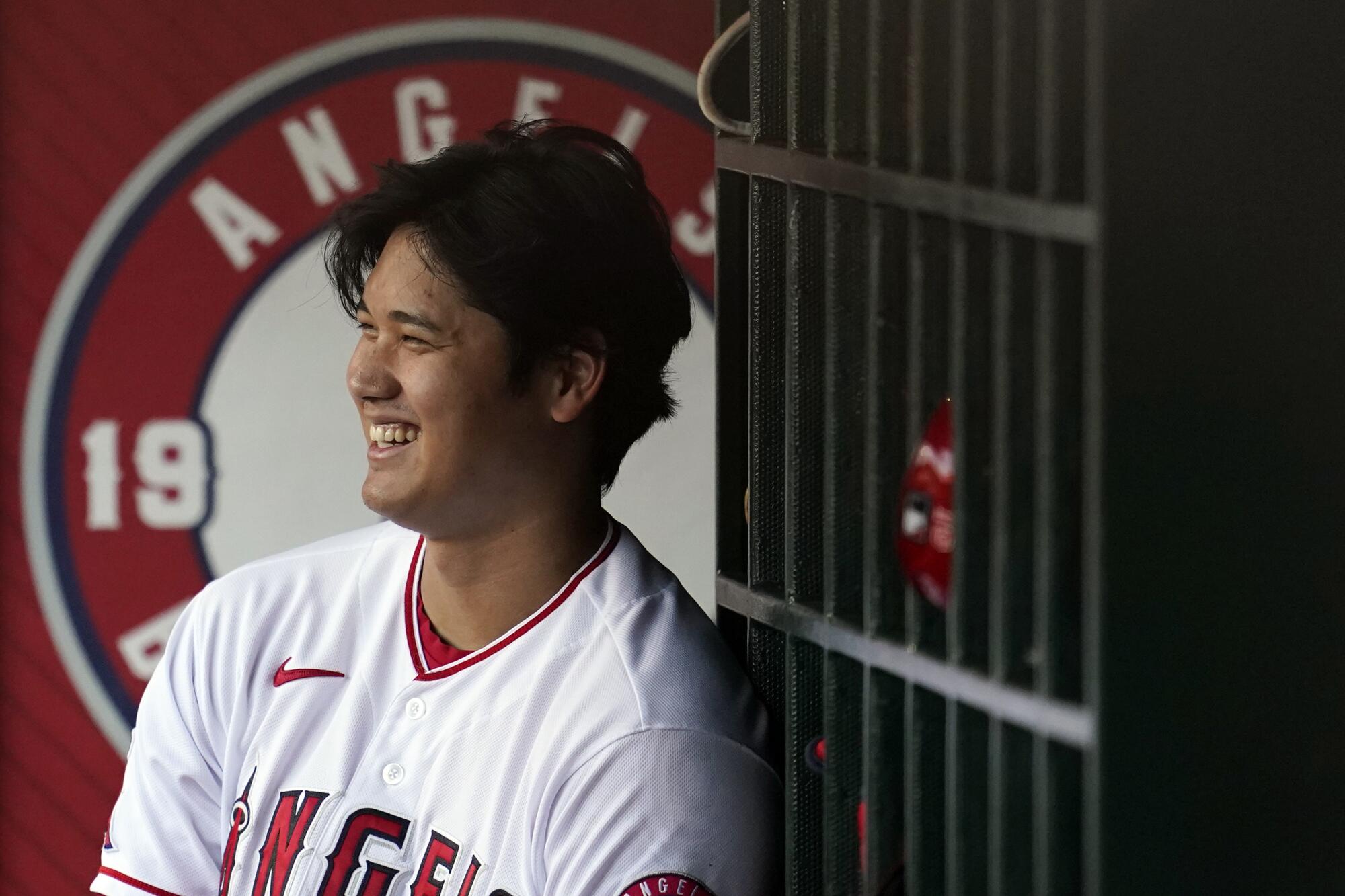
And once the regular season began, he blended an effective routine into his new everyday playing schedule with the Angels.
Instead of taking traditional pregame batting practice on the field, he conserved energy with efficient sessions in the clubhouse batting cages.
“This guy is a well-oiled machine,” hitting coach Jeremy Reed said. “From day one, when I first saw him till now, he just continues to understand himself more.”
In between each pitching start, Ohtani replaced traditional side sessions in the bullpen with regimented drill work, such as weighted-ball exercises in the outfield while Mizuhara monitored his exertion with the help of a pocket radar gun and digital readings from a small black band Ohtani wore around his elbow.
“He self-regulated himself really, really well,” pitching coach Matt Wise said. “Everyone’s like, ‘No one has ever done this before.’ But the way he handled it allowed him to do what he did.”
There was also constant communication with manager Joe Maddon, Minasian and other team personnel in the form of near-daily texts and in-person conversations (usually with the help of Mizuhara) to make sure Ohtani remained physically strong and mentally fresh.
“He truly does understand himself really well,” Maddon said at the end of the season. “I think that’s the contributing factor. That’s the main ingredient.”
It made Ohtani the unanimous choice of the Baseball Writers Assn. of America’s MVP voters, who all picked him over fellow finalists Vladimir Guerrero Jr. and Marcus Semien of the Toronto Blue Jays.
It also left those closest to Ohtani aligned by the end of the year: As long as he stays healthy, there isn’t much doubt that he’ll be able to do it all again.
“That’s what he set out to do,” said Nez Balelo, Ohtani’s agent at CAA Sports. “I think we’re just starting to scratch the surface here. It’ll be fun to see him go out and do it year after year after year. Because that’s what he wants to do.”
“I think it’s sustainable from both sides,” echoed Maddon, who says he thinks Ohtani could potentially pitch 40 to 50 additional innings next year and benefit at the plate with lineup protection from a healthy Mike Trout and Anthony Rendon.
Thirty-five years later, Al Michaels says Game 5 of the 1986 Red Sox-Angels ALCS is second only to the “Miracle on Ice” as the greatest game he’s called.
Minasian, who noted he envisions few changes to Ohtani’s usage next season, shared the same belief. He knows that what he witnessed this year was historic, more than worthy of all the plaudits, hardware and attention that came with it.
But he says he thinks it also has the makings of a repeatable routine, hopeful that it could be the start of Ohtani’s expectation-shattering achievements — and not the end.
“That’s a big reason why we talked about letting him play on a daily basis with no set rules. Just enjoy the game, go have fun,” Minasian said. “That’s what he did. And I don’t see any reason why that can’t continue.”
More to Read
Go beyond the scoreboard
Get the latest on L.A.'s teams in the daily Sports Report newsletter.
You may occasionally receive promotional content from the Los Angeles Times.

